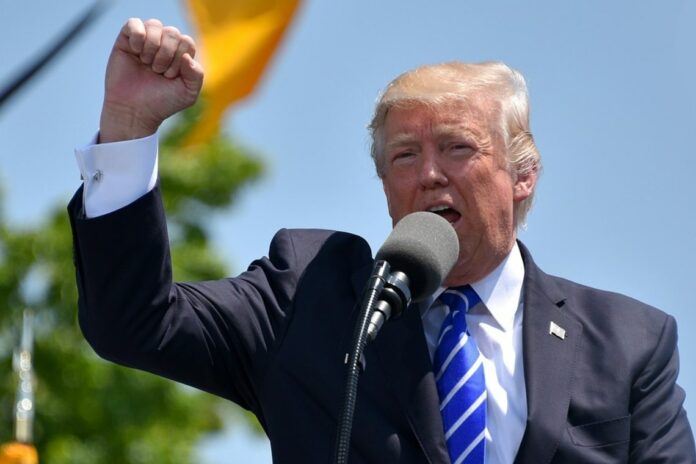In a shocking twist, the founder of crypto exchange FTX, Sam Bankman-Fried, found himself at the center of a peculiar news story, as allegations emerged that he considered a $5 billion proposal to deter Donald Trump from running for president.
The revelation, made by acclaimed author Michael Lewis, sparked intense scrutiny, shedding light on the intricate intersection of cryptocurrency, politics and law.
Summary
The controversial proposal by the former CEO of crypto exchange FTX: $5 billion to deter Trump’s presidential run
In a startling revelation, Michael Lewis, the acclaimed author of such financial bestsellers as “The Big Short” and “Flash Boys,” recently revealed that Sam Bankman-Fried, the founder of the now-defunct crypto exchange FTX, explored the audacious possibility of paying Donald Trump the staggering sum of $5 billion to avoid running for president.
This intriguing revelation sent shockwaves through the cryptocurrency community and the broader political sphere. In this article we delve into the details of this sensational claim and the legal implications it raises.
According to Michael Lewis, during an interview with CBS, Sam Bankman-Fried would seriously consider offering the monumental sum of $5 billion to convince Donald Trump not to enter the race for president.
This staggering figure arouses immediate curiosity, leaving us wondering about the motivations behind such a colossal offer.
The motivations of the CEO of former crypto exchange FTX on deterring Trump
While the exact motivations behind Bankman-Fried’s proposal remain speculative, it is essential to consider the context. Before the tumultuous fall of FTX, Bankman-Fried had established himself as an active political donor, supporting both Democratic and Republican lawmakers.
This background of political contributions suggests a desire to influence the political landscape to protect his own interests.
A key aspect of this bold proposal is its legality. Michael Lewis stated that Bankman-Fried was not only concerned about the monetary aspect, but also the legality of such a transaction.
This highlights the complexity of influencing a presidential election through financial means and the legal complexities that accompany it.
Donald Trump, a prominent figure in American politics, has always been a controversial and polarizing presence. His potential candidacy would undoubtedly disrupt the political arena.
Bankman-Fried’s willingness to pay a colossal sum to prevent Trump’s candidacy underscores the impact and influence Trump could wield in the political landscape.
In response to these shocking claims, Mark Botnick, spokesman for Sam Bankman-Fried, chose not to comment on the potential payment. This silence further adds to the intrigue surrounding this revelation.
It is unclear whether Bankman-Fried seriously pursued this proposal or whether it was just a speculative idea.
As we await the start of the trial of Bankman-Fried, who faces a number of charges, including fraud, it is essential to consider the potential legal repercussions of his alleged proposal.
If convicted, he could face a substantial prison sentence, perhaps more than 100 years. This looming legal battle further underscores the complexities and controversies surrounding the cryptocurrency industry and its intersection with politics.
FTX’s Bankman-Fried cannot blame lawyers in opening statement
As the legal drama of Sam Bankman-Fried, the troubled founder of FTX, unfolds, a recent ruling by Judge Lewis Kaplan shed light on the complexities of his upcoming trial.
While Bankman-Fried’s defense team had expressed its intention to emphasize the role of Fenwick & West’s lawyers in its opening statement, the judge decided not to do so. However, the possibility of invoking the so-called “advice-of-counsel” defense during the trial remains open.
In an order on Sunday, Judge Kaplan firmly stated that Bankman-Fried cannot use FTX’s lawyers as scapegoats for the stock market crash or operational decisions in his opening statements.
This decision stems from concerns that such a broad argument, without specific details, could potentially confuse or prejudice the jury. The judge stressed the importance of clarity and specificity in legal proceedings.
The defense team had previously informed the Justice Department and the court that it intended to argue that FTX’s consultants, both in-house and from the law firm Fenwick & West, were involved in certain decisions made by the company.
These decisions ranged from the use of self-deleting messaging services such as Signal to the creation of the enigmatic “North Dimension” entities, from the FTX entities’ banking relationships with Silvergate Bank to loans made to FTX and Alameda Research executives, from intercompany agreements to FTX’s terms of service.
However, the Justice Department objected to the defense argument, arguing that it was not sufficiently detailed and should be blocked.
More concrete arguments are needed
Judge Kaplan’s ruling aligns with this position, emphasizing the need for a more concrete and well-defined argument when introducing lawyers’ involvement in the case.
Although the judge prohibited any reference to outside counsel in Bankman-Fried’s opening statement, he left the door ajar for the defense team to revisit the issue later in the trial.
They can do so by informing the judge and the Justice Department in advance, making sure the jury is not present during these discussions.
Judge Kaplan’s ruling highlights the complexity of navigating the legal terrain surrounding this high-profile case.
It underscores the importance of maintaining a balance between the defendant’s right to present a defense and the need for clarity and specificity in legal arguments.
As the trial progresses, the extent to which attorney involvement will play a role in Bankman-Fried’s defense remains to be seen, and the judge will make decisions on a case-by-case basis, adapting to the evolving circumstances of the trial.




